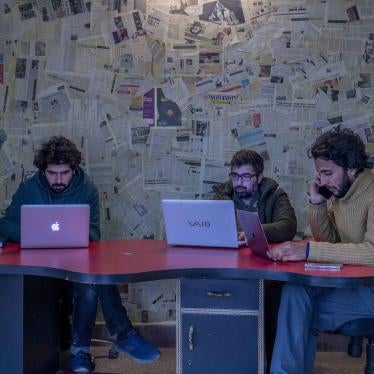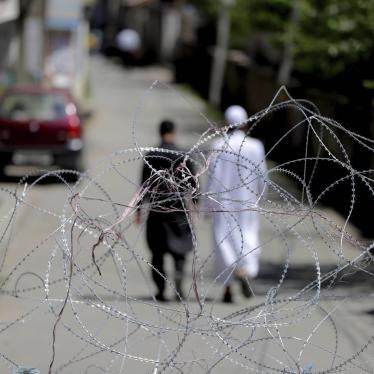(London) – The Indian government has not restored freedom of speech and association to Jammu and Kashmir five years after revoking the region’s special autonomous status on August 5, 2019, Human Rights Watch said today.
The Indian security forces continue to carry out repressive policies including arbitrary detention, extrajudicial killings, and other serious abuses. Indian authorities seek to justify abuses by contending that political violence in the region has declined considerably in the past five years, with fewer civilian and security personnel casualties. A recent surge in violence in the Jammu region since June has led to the death of 15 soldiers and 9 civilians.
“Indian authorities insist that violence has been contained in Jammu and Kashmir, but in five years they have done little to end the government assault on fundamental freedoms,” said Meenakshi Ganguly, deputy Asia director at Human Rights Watch. “Kashmiris are unable to exercise their right to free expression, association, and peaceful assembly because they fear they will be arrested, thrown in prison without trial for months, even years.”
In March 2024, demonstrators in the now separate territory of Ladakh demanded a greater participation and role in how their territory is governed. Since 2019, religious minorities and migrant workers have faced targeted attacks while hundreds of Kashmiris, including journalists and human rights activists, remain in custody under draconian detention and counterterrorism laws.
“It might seem calm with all the tourists, late night shopping, and other overt signs of normalcy, but we are festering inside,” said a 27-year-old Kashmiri businessman. “It is like a soda bottle waiting to burst.”
The authorities have continued to prosecute prominent civil society activists on apparently politically motivated charges. On July 10, authorities arrested Nazir Ahmad Ronga, the chairman of Jammu and Kashmir’s High Court Bar Association under the Public Safety Act. In June, they arrested Mian Abdul Qayoom, former president of the association and a vocal critic of government rights abuses, accusing him of murder. Within days, the local administration banned elections in the bar association, allegedly fearing a “breach of peace.”
Kashmiri human rights defender Khurram Parvez has been jailed since November 2021 under the Unlawful Activities Prevention of Atrocities Act (UAPA), India’s stringent counterterrorism law. United Nations experts have urged the Indian authorities to stop targeting Parvez, and in 2023 the UN special rapporteur on human rights defenders, Mary Lawlor, called for his release. In March 2024, UN experts reported on the “harassment and prolonged detention of human rights defenders and journalists” in the country.
Since August 2019, at least 35 journalists in Kashmir have faced police interrogation, raids, threats, physical assault, restrictions on freedom of movement, or fabricated criminal cases because of their reporting. A new media policy introduced by the government in June 2020 made it easier for the authorities to censor news in the region. In June 2024, authorities introduced a policy to protect public officials in the region from alleged false complaints and recommended punishing media publications complicit in spreading misinformation, which raised concerns over government accountability and threats to press freedom.
In several cases, the police kept people in custody by filing new allegations after courts granted them bail, or quashed detention orders and even ordered compensation. In March, authorities rearrested Aasif Sultan, a Kashmiri journalist who had just been released after spending more than five years in prison, filing another case under the UAPA. In May, police arrested the lawyer Zahid Ali under the UAPA, having kept him detained since 2019 by repeatedly filing new cases.
The High Court of Jammu and Kashmir has rebuked the authorities for misusing the Public Safety Act for repeated preventive detentions, even after courts have ordered release. In one case the judge noted: “It appears as if the preventive detention jurisdiction is answerable to no one.”
The authorities have also used the counterterrorism law in an arbitrary manner to crack down on peaceful critics, journalists, and human rights defenders to silence dissent. In recent years, the number of UAPA cases in Jammu and Kashmir has increased significantly. In 2022, the region recorded the highest number of such cases in the country with 371 cases out of the total 1,005, according to data from the National Crime Records Bureau.
Between 2019 and 2021, the government shut down the internet in Jammu and Kashmir for an unprecedented period of over 500 days, saying restrictions were necessary to prevent the spread of false or incendiary information that could cause violent protests. But the shutdowns caused disproportionate harm to the population, by exacerbating an information blackout, stopping families from communicating, preventing people from accessing essential activities and services – including medical services – and disrupting the local economy. In 2019, United Nations experts urged India to end the communications blockade. Denying access to the internet in Jammu and Kashmir, and other parts of India has become a default policing tactic by Indian authorities.
Prime Minister Narendra Modi said in an interview in May that because of government internet shutdowns, “there were difficulties for a few days, but it was for a good cause,” and warned against groups that sought judicial intervention. “Now when these issues become a discussion in courts then things get disturbed,” he said. “Such NGOs who go to court, firstly it is very important to save the country from them.”
Since 2019, the Indian security forces have been implicated in numerous abuses including harassment and ill-treatment at checkpoints, arbitrary detention, and extrajudicial killings. There has been no accountability for these recent alleged extrajudicial killings or past killings and abuses by security forces, in part because of the Armed Forces (Special Powers) Act (AFSPA), which provides members of the armed forces effective immunity from prosecution. Since the law came into force in Jammu and Kashmir in 1990, the Indian government has not granted permission to prosecute any security force personnel in civilian courts.
Hundreds of thousands of Kashmiris, many of them Hindu, known as Pandits, were displaced from the Muslim-majority Kashmir Valley after a spate of attacks by militant groups in 1989-1990. Only a few hundred displaced Kashmiri Pandit families have returned in response to government programs to create jobs and shelters. But the authorities have failed to address their security concerns. Many fled after gunmen shot a Kashmiri Pandit in 2022 among other targeted killings of minorities and civilians since 2019.
“Indian authorities need to rethink their approach to Jammu and Kashmir, and prioritize justice for victims of abuses,” Ganguly said. “The government should provide remedies for those whose rights were violated and bring abusive forces to account.”









